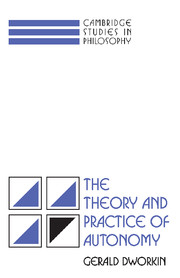Book contents
- Frontmatter
- Contents
- Preface
- Acknowledgments
- PART I THEORY
- PART II PRACTICE
- 6 Consent, representation, and proxy consent
- 7 Autonomy and informed consent
- 8 Paternalism: some second thoughts
- 9 The serpent beguiled me and I did eat: entrapment and the creation of crime
- 10 Behavior control and design
- Epilogue
- Bibliography
- Index
8 - Paternalism: some second thoughts
Published online by Cambridge University Press: 05 June 2012
- Frontmatter
- Contents
- Preface
- Acknowledgments
- PART I THEORY
- PART II PRACTICE
- 6 Consent, representation, and proxy consent
- 7 Autonomy and informed consent
- 8 Paternalism: some second thoughts
- 9 The serpent beguiled me and I did eat: entrapment and the creation of crime
- 10 Behavior control and design
- Epilogue
- Bibliography
- Index
Summary
“I changed my mind.”
“Oh, yeah? Does it work any better?”
From a Mae West movieAs seems appropriate for second thoughts, I shall begin at the beginning—the definition of paternalism. Elsewhere, I defined the concept as “interference with a person's liberty of action justified by reasons referring exclusively to the welfare, good, happiness, needs, interests, or values of the person being coerced.”
A number of critics have objected that confining the concept to interference with liberty is too restrictive in scope. Given the problem I was interested in, that is, the proper limits of state coercion, this restriction was reasonable, although even here one ought to be aware that the state has other ways of influencing people's behavior. It may refuse to enforce contracts, give in-kind rather than cash aid, set up licensing boards, require manufacturers to install seat-belts as original equipment, and so forth.
If, however, one wishes to consider the issue of paternalism in other contexts, for example, in the professions, one will need a broader definition. Not all paternalistic acts are acts of the state. Not all paternalistic acts involve interference with liberty. The doctor who lies to her terminally ill patients, the parent who stipulates in her will that a child may not inherit an estate before the age of thirty, the psychiatrist who tells his adolescent patient that he must inform her parents of her drug use, the professor who refuses to recommend her Ph.D. student to a certain university because he will be “out of his league” – these are all cases of paternalism that do not involve the use of coercion or force and, therefore, on standard views of liberty do not involve restrictions on liberty.
- Type
- Chapter
- Information
- The Theory and Practice of Autonomy , pp. 121 - 129Publisher: Cambridge University PressPrint publication year: 1988
- 8
- Cited by



